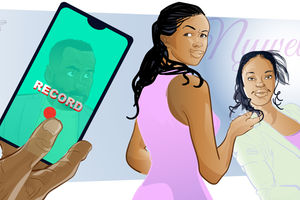
Carrol Muthoni, popularly known as Sonnie, is a content creator based in Nairobi. She talks about how she survived rejection and depression.
Carrol Muthoni, popularly known as Sonnie, has been a familiar face in the limelight for several years, often making headlines due to her high-profile relationship with comedian Mulamwah.
Their breakup followed the birth of their daughter.
In this interview, Sonnie opens up about her journey, from her early days in performing arts at St. Constantine's International School in Tanzania to landing her breakthrough role on The Real Households of Kawangware. She also reflects on the challenges she faced, including rejection and public scrutiny, and how she built a successful social media presence that now fuels her career.
1. Can you tell us about your journey into the limelight and what made you feel like giving up at one point?
My journey began in performing arts back in school at St. Constantine's International School in Arusha, Tanzania.
After returning to Kenya, I joined Talanta Institute, where I studied performing arts.
I started by doing auditions and monologues, and eventually, I was noticed by the producer of The Real Households of Kawangware, where I got my first role.
Over time, I built myself up, though I struggled with rejection which made me question everything.
There was a point, especially after my struggles became public, that I felt like giving up.
The rejection and the public scrutiny made it hard but I thank God that each challenge taught me resilience.
Now things are looking up. I’m glad I didn't give up. My social media pages are paying me well.
2. How did your faith and family support you through difficult times?
My family have been my rock. They were there daily reminding me that things would be okay. My dad made sure to check on me daily.
As for friends, it was a mixed experience. I had a few close ones who stayed, but many others distanced themselves.
One thing that surprised me was the church's response. During hard times I reached out, hoping for support, and often found that instead of offering help, some were more focused on discussing my situation.
These experiences changed my perspective on friendship and community. While I have not gone back to church, I hold no hard feelings. Maybe I had too high expectations, but therapy taught me the importance of letting go.
Holding onto grudges would only harm my peace, so I chose to release those feelings for my well-being.
3. After a public breakup, what impact did therapy have on you, and who encouraged you to seek help?
After my role as Chantel on Inooro TV ended, COVID hit, and things got tough.
I had to step away from work, and life became tough financially.
Then came the public breakup with my baby daddy, Mulamwah, it all just felt like too much at once.
I am grateful to God for everything, though, because I have come to realise that every challenge is meant for growth, even if it doesn’t feel that way at first.
Back then I was overwhelmed and depression crept in. I felt like giving up. One day, I was scrolling through Instagram and I saw a post from comedian Nasra, who was sharing her own story of overcoming depression.
Something about her words struck me, and I just started crying.
I reached out, and she responded right away. We talked for hours, and she encouraged me to try therapy. She was so genuine and supportive, and despite my initial doubts about therapy, she convinced me it would help.
Not only did she guide me, but she also covered the costs for six months.
Thanks to her, I learned to see healing as an internal journey. This was life-changing. I started looking at things in a positive way and that has been my mantra.
4. You have been able to build a significant presence on social media, especially on YouTube and Instagram. How has social media impacted your career?
Social media has been instrumental in my career; it pays all my bills now. When I got back to YouTube, I put in the work, and it eventually paid off. I even received my silver play button!
Social media has given me a platform to share my journey and connect with others.
It has not been easy, especially with the criticism that comes with it, but it is rewarding, and it has helped me reach a bigger audience.
5. What advice would you give to others who are co-parenting and why did you quit your accounting career?
The key to co-parenting is respect.
The moment you realise you and the other parent cannot be together, but you still have a child to raise, respect becomes essential.
Boundaries are important too. Issues only arise when unresolved problems are involved.
So, focus on creating a respectful environment for your child and don’t let past differences interfere with parenting.
On quitting the accounting profession, I realised I was mostly to make my dad happy.
I studied accounting for about three years, but honestly, I was not passionate about it. I knew I would struggle if I continued because I was doing it for someone else, not for myself.
You know when you follow your passion, the results are always different and you enjoy the process and feel fulfilled. That's why I dropped out and focused on performing arts.






